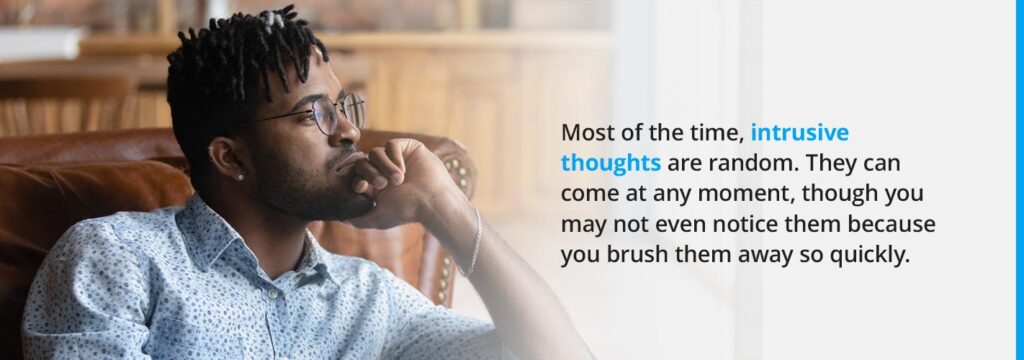Picture this: you’re enjoying a perfect day, the sun is shining, and you feel like nothing could go wrong when a random thought hits you. It fills you with dread, but rather than letting it pass you by, your mind can’t help but hang onto it. Suddenly that perfect day you were having doesn’t seem as perfect anymore with the unwelcome thought that made itself at home in your head. Rather than enjoying the sunshine like earlier, you’re focused on that unsettling thought. If you’ve ever had this happen to you, rest assured you’re not alone.
What Are Intrusive Thoughts?
Intrusive thoughts are unwanted thoughts, images, impulses or urges that pop into your mind. Since they are intrusive, these unwanted thoughts and images can cause feelings of anxiety, guilt, shame or even fear. They can take any form, but some of the most common themes of intrusive thoughts include:
- Violent thoughts: Sometimes intrusive thoughts center around hurting yourself or others around you. You don’t actually want to do these things, but they just pop into your head. It can be hard to ignore unsettling thoughts saying, “What if, deep down, a part of me wants to act on these thoughts?”
- Paranoia or fearful thoughts: Our phones and the internet make it easy for all of us to stay connected to each other, but it’s also easy for us to have thoughts of unwanted attention from people we don’t know. Feelings of paranoia can present themselves to us at any time.
- Sexual thoughts: We all think about sex. It doesn’t matter your gender or sexual orientation — it just happens. People can have intrusive thoughts related to sex, their sexual identity or orientation and their gender regularly.
- Thoughts about religion: For those whose faith plays an essential role in everyday life, thoughts of religious blasphemy can present themselves at any time. It’s completely normal to think about ideas and actions that may be frowned upon or go against your religion.
- Negative thoughts: It’s easy to fall into the trap of negative thoughts about yourself. We all experience thoughts of self-doubt, like “Why can’t I do anything right?” or, “Do my friends actually like me?”
Are Intrusive Thoughts Normal?
Intrusive thoughts are normal, and you’re not alone if you’ve ever had unwanted thoughts. Almost everyone experiences intrusive thoughts occasionally in their day-to-day life.
Additionally, intrusive thoughts are common in people with existing mental health conditions, such as post-traumatic stress disorder (PTSD), obsessive-compulsive disorder (OCD), anxiety and depression.
Why Do We Have Intrusive Thoughts?
Most of the time, intrusive thoughts are random. They can come at any moment, though you may not even notice them because you brush them away so quickly.
For some individuals, they may not feel random. Though this isn’t always the case, intrusive thoughts can sometimes be the result of underlying mental health conditions, like:
- OCD: Those with OCD experience intrusive thoughts about repeating specific behaviors and habits, as well as what could happen if they don’t stick to those habits.
- Anxiety: Stress and anxiety can trigger intrusive thoughts. People with anxiety and high stress levels can attribute more strength to these intrusive thoughts and therefore focus more time and energy on preventing them.
- Depression: Thoughts of self-doubt are often associated with depression. In more severe cases, thoughts of self-harm can also occur.
- PTSD: People dealing with PTSD experience intrusive thoughts from past traumatic experiences. These memories can appear via triggers or enter a person’s mind unbidden.
5 Tips for Handling Intrusive Thoughts
It can be challenging to know how to deal with intrusive thoughts. Remember, these intrusive thoughts do not define us, nor do they make us a “bad” person in any way. While intrusive thoughts are inconvenient and, at times, distressing, they are not our reality, and we can choose not to act on them.
At Merrimack Valley Psychological Associates, we understand there’s no one-size-fits-all solution for how to live with intrusive thoughts. However, many different methods can help manage and even reduce unwanted thoughts, so you can find the best way to handle intrusive thoughts for you. Here are a few tips for intrusive thoughts that anyone can try:
- Avoid suppressing the thought: In many ways, intrusive thoughts are like boomerangs — you can try to throw them out of your mind, but sooner or later, they’ll come back. If you consciously try to suppress these thoughts, you give more power to them. Generally, a person’s stream of consciousness gravitates toward a topic they know they’re supposed to avoid.
- Acknowledge intrusive thoughts: Rather than fighting intrusive thoughts, acknowledge them. Noticing an intrusive thought and seeing it for what it is can be a more effective way of banishing it from your mind for good and helps you avoid channeling unnecessary energy towards it.
- Take in your reality: Remind yourself your intrusive thoughts are not your reality. No matter how unsettling or scary they may seem, intrusive thoughts are not indicative of how things truly are, nor are they omens of the future. You are in charge of your reality, and you dictate your future.
- Know your triggers: Sometimes, specific situations or circumstances can trigger intrusive thoughts. If you experience intrusive thoughts frequently, track when you notice them and look for a pattern. Finding and avoiding your triggers can help you reduce intrusive thoughts in the future.
- Seek positivity: Immerse yourself in a healthy activity that diverts your attention from unwanted thoughts that keep demanding your attention. You have the power to ignore intrusive thoughts, and doing activities you enjoy is an excellent way to occupy your mind and combat intrusive thoughts. Try reading a book, exercising, completing a puzzle or brain teaser or watching TV.
Contact a Merrimack Valley Clinician for Support
You don’t have to deal with intrusive thoughts alone. The experienced clinicians at Merrimack Valley Psychological Associates can help you develop successful coping mechanisms for intrusive thoughts so you can live your life without worrying about them. Contact us using our online form or call us at 978-482-7351 to schedule an appointment with one of our clinicians at our Andover, Massachusetts, office or set up a teleconference.
Reviewed By
Dr. David Rainen, PsyD.
I am a licensed clinical psychologist with an extensive background treating a variety of different ages, situations, emotional and mental health disorders in individuals and their families. As part of my 10 year professional and training career in psychology, I have developed and refined my skills and approaches through my work in a variety of diverse settings including: hospitals, community outpatient facilities, college counseling centers, secure and unsecure inpatient/residential treatment programs, and therapeutic day schools.




